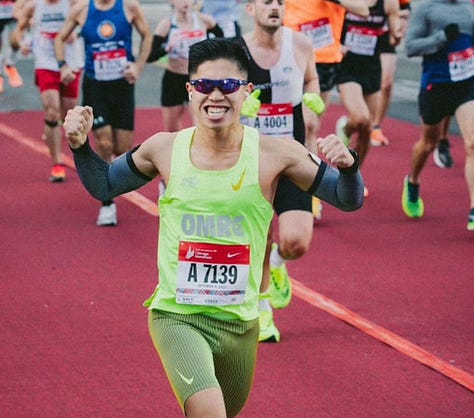Are You Recovering Right?
I’ll admit, I’ve never been too interested in running a marathon. Give me an intense HIIT and Hills ride, a two-hour dance class, an ocean swim, an all-day bike race … But a run? It’s a struggle. But with marathon season upon us, I wanted to chat to some of the runners in my life about their recovery regimes. Because while I may not be a runner, recovery is something I can absolutely get behind.
To be able to perform at my best – particularly when my job can be taxing – I need to take care of myself. That doesn’t mean grinding it out with more intense workouts; it means making time for the complementary activities that support my body. What that looks like is different each day, and I will dabble in just about any modality. Acupuncture, physical therapy, massage, stretching (of course). And I’m always up for learning more.
Whether you’re gearing up to run a marathon this season or are just looking to perform at your best each and every day, I hope you enjoy these running-specific recovery tips from some of the most committed and talented runners I know.

(Including a very special guest, my teammate Matt Wilpers. For those of you who run, ride and row with Matt, you’ll know what an expert he is, and I know you’ll enjoy his contributions to this article.) Ready to take some notes? I am!
What do you do after a marathon?
Thomas: Immediately after a race, I’ll hydrate; ideally with something containing calories (not just water or electrolytes). I’ll usually stock up on matcha lattes or mochas to get fuel fast. My stomach is not usually in the best shape after a tough run, so that’s why I prefer liquids with macromolecules in the first few hours before I transition to solids. I then get back to my hotel and take a warm shower to loosen my muscles. Then, I immediately put my feet up at a 90 degree angle from my hips to my toes, using the bed and wall for leverage. It helps with my blood and lymph flow.
Emily: Straight after a race, I turn to my compression boots (if I’m at home) or my more portable massage gun. I actually prefer the massage gun because it can better target the area that is sore. If the race is at “home,” I have the bad habit of succumbing to the couch for the day. But I have found from traveling to a few races that continuing to move the rest of the day is actually in the best interest of my recovery. Making plans to get to lunch or dinner with friends is actually a great way to make sure you get off the couch and walk somewhere to stretch out the legs!
Matt: Start taking in fluids and electrolytes pretty much immediately to help replenish what was lost. Then spend some time cooling down and stretching. The higher the intensity of the race effort, typically the longer I take on this. For example, I ran a couple miles for a cool down after a recent 1-mile race simply because I needed that much distance to calm my body back down. I then move into a thorough static stretch afterwards. This really helps reduce the subsequent stiffness.
Taking in a recovery drink that has some carbs and protein in it soon after you finish cooling down can also be helpful to help replenish the glycogen reserves and rebuild muscle. I usually try to have something like this (if not more substantial) within one hour after finishing a race.
Then, get your race gear off ASAP, get showered up and take care of your skin (i.e., moisturize)!
- Continue taking in nutrition and likely by now you can tolerate more solids to get a more complete mix of your macronutrients in (carbs, fats, protein).
- Get off your feet and relax! While doing this, I like to have compression socks or sleeves on as it helps me chill mentally and also reduces inflammation in my legs. Everyone’s got their thing, even ice baths, but unless I have to race or have to train hard the next day, I shy away from ice baths simply bc I don’t enjoy them all that much.
What about in the week that follows?
Thomas: The day after a marathon, I’ll do at least two miles of a very easy jog, or a good hour of walking. It seems counterintuitive, but it helps me physically from being too stiff, and mentally it keeps me going. My body’s been through a rough patch, but it can still move! it keeps my mental momentum up. In the days that follow, I skip all workouts and instead, focus on things that bring me joy. Whether it’s catching up with friends, finding a good pastry and doing fun workouts that I would typically not do, so I can refocus and reset for my next goal.
Emily: I typically skip workouts, especially running. If I feel the desire to run, I may go out and do 2-3 miles, but that is only if it’s a beautiful day. A lot of people talk about the next time they will run after a marathon, and I just don’t want to put that pressure on myself. In the weeks that follow, I try to stick to a routine of Pilates or strength training, and then work running back in once I have the desire to get back at it. Running has to be a place of pure joy to me after a long training cycle. If I force myself to do it, it begins to feel like a chore. So in the weeks after, I definitely avoid putting pressure on myself to run.
Matt: For the subsequent days/weeks after a race, I try to get back to light activity ASAP. This can be tough if the level of fatigue is deep. Things like a swim, walk, yoga, light stretch, etc. These are great for getting the body moving without overloading it and causing it to take longer to recover.
If it was an “A” race for the season, I usually give myself time to fully recover (mentally and physically) before starting training back up again. This can take a varying amount of time. If it was a “B” race (or training race), I get back to training ASAP, even if there is a little left over fatigue.
What’s your secret to a quick recovery?
Thomas: It sounds cliched, but finding happiness in what I do. Finding joy and purpose in the workout reminds me that though the race/workout/whatever was tough, I have a bigger goal of making myself proud. Without a solid anchor or goal, doing these rough training sequences while sacrificing time you’d spend on other things – friends, work hobbies – may seem like a waste of time. Finding your “why” limits that risk and can propel you to your next stepping stone.
Emily: I love running because training for a race gives me the structure and schedule that I desire. However, after 16+ weeks of an intense cycle, I need a break from that. so I think the trick to a quick and successful recovery is to not put pressure on yourself to start back up at that intensity right away. Running for fun, mental respite, and pure happiness is where I focus my initial runs back after a race. I love a beautiful sunny run in the park, or a Peloton Tread class with a killer playlist, or an easy run chatting with a friend. I do a lot of that until my body craves the discipline and structure of another training cycle.
Matt: I don’t think I have a secret other than getting back to moving/light activity. I then focus on quality of nutrition and sleep. While I may feel like I deserve to eat/drink whatever junk I want after a race, consuming quality nutrition really helps you recover faster vs just adding to the inflammation. Sleep is of course most important. I try to get to bed so early that I wake up before my alarm clock the next day (i.e., allowing my body to decide when is enough sleep vs my alarm).
I visit my physical therapist at least once per week and we are usually focusing on restoring mobility to do with any tightness that creeps in. This helps tremendously. Then, after an “A” race, I like to treat myself to a massage.
Matt also runs Team Wilpers , who offer private coaching and virtual bike fit and technique analysis for athletes of all levels.
While I may not be training for an event, I like to think that I’m training for every day. So with that, I’m off for an assisted stretch. What are you doing for yourself today? Let me know.











Comments (0)